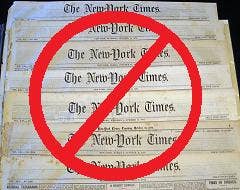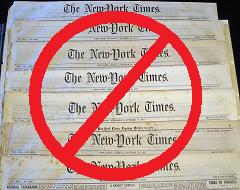NY Times To Stop Printing. Old Media is Dead, Long Live New Media

Share
Stop the presses! At the recent IFRA Conference in London, New York Times Chairman Arthur Sulzberger jokingly admitted that his company would eventually stop printing physical copies. For many such a half-hearted concession is a statement of the obvious, but we shouldn't overlook the necessity of this shift in tactics. In order to survive newspapers are looking to drop the paper and keep the news. The NY Times has already redirected a large portion of its efforts to growing its online presence, and it is leveraging its trusted name to transition its loyal readership with it as well as garner new followers. Can one of the kings of the old media claim its crown in the new media?
The new media ecosystem is still so chaotic that no one is certain which niches will be the best to fill. In its current old media shape, the NY Times is a huge financial institution. It spends hundreds of millions on its newsroom. In order to continue to do so, it will have to find ways of gathering large income from its online offerings. It's current plan is to create a paywall such that a rare visitor to the site will be able to read articles freely, but a regular customer will have to pay a fee. The new paywall is set to go up January of 2011. Will readers actually pay to read the NY Times online? Can this revenue sustain the giant corporation?
I have a hard time paying for information. In fact, I go out of my way to read things for free online, even if it involves hard work and some ingenuity. The NY Times is a valuable resource, perhaps incomparably so. But I'm not going to pay for it...unless it is outrageously cheap, say $1 a month. Even then, there's really only a 50/50 chance. I've simply become too used to freedom and to paying for what I want by watching advertisements.
Few other US newspapers are using paywalls. The Wall Street Journal is a notable exception. I can find most of what I want there for free (with a little creative Googling) but I still run upon the occasional story that is locked away behind the paywall. You know what I do when I find myself blocked in this manner? I move on. Something in me just says, "eh, if it's that important I'll be able to find it for free somewhere else." As a journalist I know this simply isn't true. There is a lot of vital science data, political information, and financial statistics that can only be found through price incurring channels. Yet as a consumer I cannot escape the mindset that the really important information is free.
Be Part of the Future
Sign up to receive top stories about groundbreaking technologies and visionary thinkers from SingularityHub.


Free and online. I may be an atypical case study, but I spend a lot of time on the internet and I've come to expect that everything should be there open and ready for my digital consumption. 90% of the time I'm right.
By moving more of its efforts online, the NY Times is following what seems an inescapable truth - the old media is dead, and those who wish to conquer the new media need to learn how to do so quickly. Yes, the NY Times will stop printing physical copies of its paper. Every newspaper will, eventually. But the transition online is less about the loss of the the physical and more about understanding our attitudes about the digital. I hate paying for things online and I'm relatively old for an internet troll. It seems even less likely that the upcoming younger and more savvy generation of media consumers is going to concede to the NY Times' paywall. How is one of the great papers of the world going to continue without new young readers?
It may simply not survive in its current form. None of the large media magnates may survive, and frankly that scares me. I like reading stories that take thousands of dollars to produce, and I like watching news channels that have the budgets to send people around the world to gather information, but these things may fade in the years ahead. The NY Times might spend $10,000 on a good story while I spend....well, considerably less. Bloggers might beat the traditional news outlets in a dollar spent-per-page view contest. If so, then it seems inevitable that high price journalism will eventually die out, or at least become much less common. The public may have to rely on crowd-sourced news. Old media is dying, and the new media might be more about consumers who also produce stories than dedicated journalists. I wonder if Arthur Sulzberger and the NY Times have a joking comment about that.
[source: Editors Weblog, NY Times]
Related Articles

New Device Detects Brain Waves in Mini Brains Mimicking Early Human Development

This Week’s Awesome Tech Stories From Around the Web (Through February 28)

Sparks of Genius to Flashes of Idiocy: How to Solve AI’s ‘Jagged Intelligence’ Problem
What we’re reading
